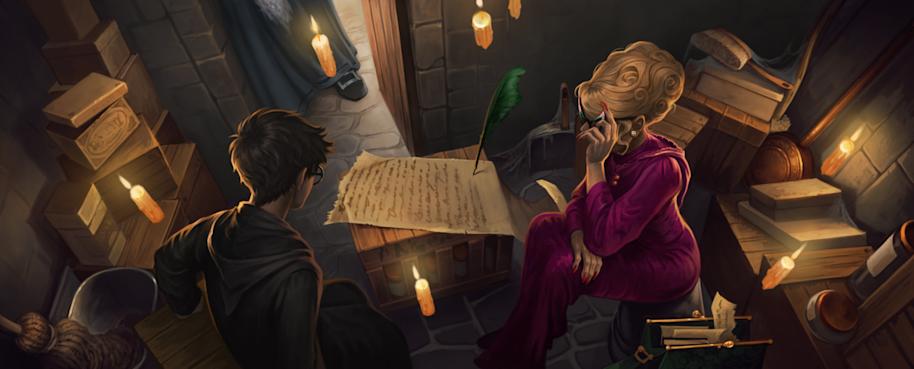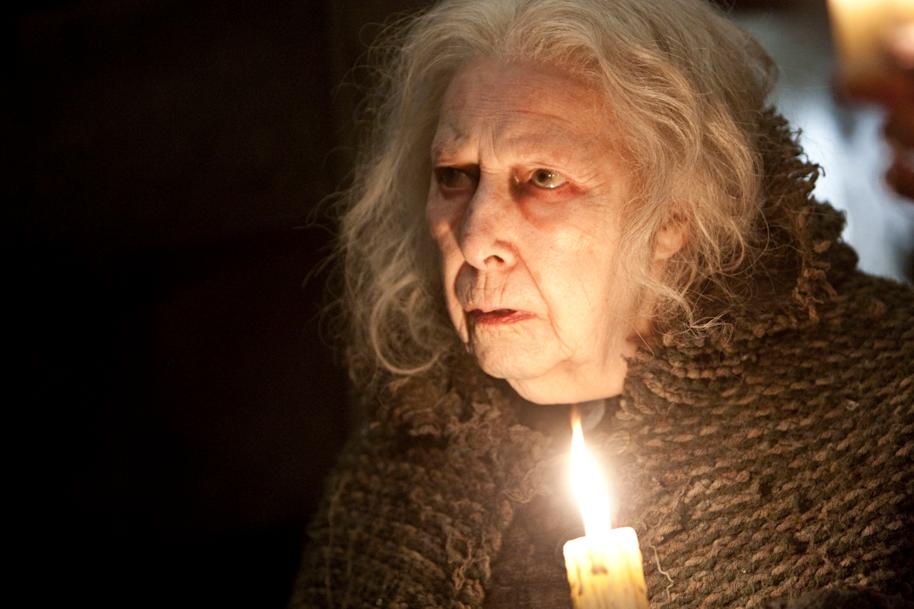
In Fantastic Beasts, we got to learn about one particularly brilliant author, Newt Scamander. But who else puts quill to parchment, and who was the best at it?
Who would win the wizarding world equivalent of a Pulitzer? Whose books probably end up in a dusty old bargain bin at the back of Flourish and Blotts? We’ve worked out who we think are the best and worst wizarding writers out there.
Bathilda Bagshot

If you’re looking for an ‘old hand’ writer you can rely on, look no further than eccentric historian Bathilda Bagshot.
Basically, if we were actual wizards-in-waiting ourselves, Bathilda’s stuff would be our go-to blagger’s guide for wizarding world knowledge, and it would also give us the basic framework to understand what the heck was going on. This was kind of Bathilda’s speciality, and she was well respected in the wizarding world for it, as well as making the top of our list. Bathilda’s well-known textbook A History of Magic was, after all, crucial to the Hogwarts syllabus.
From extracts of the book, seen throughout the Harry Potter stories, we can get a glimpse into her writing style – and it sounds like quite a good read.
Non-magic people (more commonly known as Muggles) were particularly afraid of magic in medieval times, but not very good at recognising it. On the rare occasion that they did catch a real witch or wizard, burning had no effect whatsoever. The witch or wizard would perform a basic Flame-Freezing Charm and then pretend to shriek with pain while enjoying a gentle, tickling sensation. Indeed, Wendelin the Weird enjoyed being burnt so much that she allowed herself to be caught no fewer than forty-seven times in various disguises.
Harry Potter and the Prisoner of Azkaban
Maybe Harry and Ron should’ve actually properly read the thing…
Beedle the Bard

Kind of like a wizarding version of Aesop’s Fables, Beedle the Bard’s classic book of stories is cemented into the childhood memories of much of the wizarding community.
Like Aesop’s, each of Beedle the Bard’s tales has a lesson to be learned, like that of the three brothers who tried to evade Death, or the warlock who thought he was too good for love so cut out his own heart. Lovely. The darkness in Beedle’s stories is very reminiscent of the twisted tales of Muggle children’s author Hans Christian Andersen, and could result in some quite gruesome scenes – which we love, obviously.
Kennilworthy Whisp

Coming in third place is Quidditch expert Kennilworthy Whisp, best known for his seminal textbook Quidditch Through the Ages, which Albus Dumbledore described as one of the most popular titles in the Hogwarts school library. (What a surprise that a tome about a cool flying sport was one of the top Hogwarts books. We demand justice for Unfogging the Future!)
To be fair to Whisp, he got to write about a very exciting topic: Quidditch is quite obviously the best sport ever. However, it was his well-researched and passionate work in Quidditch Through the Ages that led to the book being a wizarding world favourite. This was just a guy living the dream, basically.
Xenophilius Lovegood

Not the best fact-checker in the world (case in point: accusing Sirius Black of being an innocent singing sensation), Xenophilius Lovegood made up for what he lacked in research in, er, colourful personality.
We imagine if he was in the Muggle world, he’d be quite an efficient blogger, perhaps with a strong underground cult following. As it is, Xenophilius was the editor of his daughter Luna’s beloved Quibbler, which is, naturally, self-printed at his home in Ottery St Catchpole.
A million miles away from the Daily Prophet, The Quibbler offered an alternative approach to wizarding journalism, with fun features on Crumple-Horned Snorkacks, quizzes and more experimental pieces, like an entire article written in runes that needed to be read upside-down.
For creativity, old Xeno gets ten out of ten, but The Quibbler could get serious too. When the Second Wizarding War came into full swing, Luna’s eccentric dad defended not just Harry, but Dumbledore as well, and his magazine provided a much-needed contrast to the Daily Prophet, which was increasingly suffocated by pressure from the Ministry.
Fight the power, man!
Gilderoy Lockhart

Yes, Gilderoy Lockhart was a fraud, a liar, a scoundrel and an egotistical fame-hungry self-obsessed hair-twirling moron. But you’ve got to hand it to him: he was a hell of a fiction writer.
Having the audacity to add his entire bibliography to the Hogwarts Defence Against the Dark Arts syllabus is quite something, and although they didn’t provide any factual help for the students, they were probably quite entertaining. He didn’t really teach the students how to protect themselves against ghouls, but they did learn in explicit detail how Gilderoy ‘gadded’ with them. We also have to give Gilderoy brownie points for his strong alliteration game in his titles. Come on! Break with a Banshee? Holidays with Hags? Wanderings with Werewolves? You can’t deny they’re catchy. Oh dear, maybe we’re part of the problem.
Rita Skeeter

But even worse – if possible – than the lies of Gilderoy Lockhart were the Quick-Quotes-Quill-tinged untruths of Rita Skeeter.
While Gilderoy at least provided us all with a bit of a laugh, Skeeter was just despicable, with her tabloid-journalist style nosiness that caused genuine upset in people’s lives. Her work was kind of similar to some journalism you see in the Muggle world.
Rita even literally bugged people to get her scoop – being an unregistered Animagus of a beetle, and all. We saw extracts of her work presented across the Harry Potter books, and her style was typically biased, salacious and often damning.
So what was Albus doing, if not comforting his wild young brother? The answer, it seems, is ensuring the continued imprisonment of his sister. For, though her first gaoler had died, there was no change in the pitiful condition of Ariana Dumbledore. Her very existence continued to be known only to those few outsiders who, like ‘Dogbreath’ Doge, could be counted upon to believe in the story of her ‘ill-health’.
Harry Potter and the Deathly Hallows
Another thing: how much work was Rita Skeeter doing anyway? Her Quick-Quotes Quill seemed to do most of her writing. Was the quill really a hands-free device for Rita’s thoughts or was she plagiarising a sentient piece of stationery? Or was it some cruel version of autocorrect, where the quill already knew what Rita would probably say?
Whatever Rita’s writing process, you wouldn’t catch us dead with a copy of Armando Dippet: Master or Moron any day. See you in the bargain bin, Rita.



